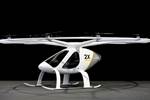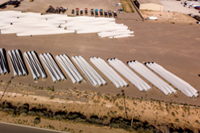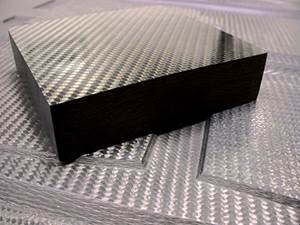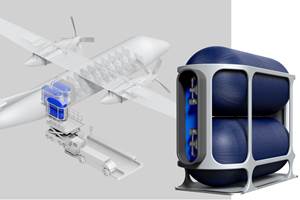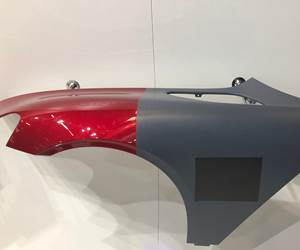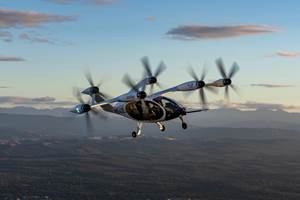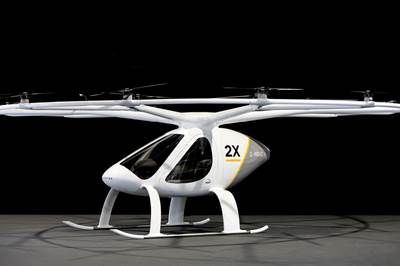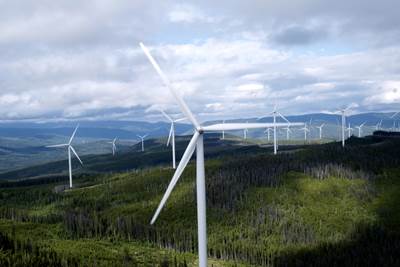Beta secures order for 20 composite eVTOL ALIA aircraft
Blade Urban Air Mobility operators to receive first passenger-configured Beta aircraft in 2024. Additional partners span medical, logistics, defense and passenger market segments.

Beta Technologies’ composites-intensive ALIA aircraft. Photo Credit: Beta Technologies
On April 13 Beta Technologies (South Burlington, Vt., U.S.) and Blade Urban Air Mobility (Blade, New York, N.Y., U.S.) announced a binding agreement through which Blade will secure up to 20 Beta electric vertical aircraft (EVA), becoming BETA’s first passenger service customer. This news comes on the heels of UPS’ announcement that it would buy up to 150 Beta EVA aircraft, plus charging stations, as part of that company’s long-term solution to reducing greenhouse gas emissions.
Founded in 2017, Beta and its team of aerospace engineers are building an electric powered ecosystem for aviation, the heart of which is ALIA, the electric vertical take-off and landing (eVTOL) aircraft that can carry up to six people or three standard cargo pallets, and of which is manufactured using composite materials and processes. Beta’s aircraft is said to emphasize simplicity, efficiency and sustainability, with customers found in logistics, medical, defense and, now, passenger aerospace markets.
“Blade is flying people in and out of cities every day, and we’re excited to partner together with the leader in UAM to create a new paradigm in passenger aviation,” says Kyle Clark, Beta’s founder and CEO. “Beta is a pragmatic company building pragmatic aircraft. It’s clear that the simplicity of our approach, strength of our technology, consistent progress against our timelines as well as the expertise of our team resonates with the best operators in the world. We are excited to partner with Blade and serve the passenger mission.”
According to Blade founder and CEO Rob Wiesenthal, Beta’s progress is formidable, with a scheduled delivery for ALIA slated to begin in 2024, which is ahead of Blade’s current projected deployment of EVA in 2025. Further, with this announcement, Blade says it has become Beta’s first passenger service partner. Additional customer validation for the eVTOL aircraft comes from United Therapeutics, Beta’s first customer and partner, which will rely on Beta’s aircraft to deliver organs for human transplantation, as well as the U.S. Air Force (USAF), which continues to participate in the Beta flight test campaigns as a part of its innovative USAF Agility Prime program.
Beta’s ALIA aircraft will have a 250 nautical mile range with a cruising speed of up to 170 miles per hour. Blade’s service with ALIA will begin on select routes using Blade’s existing private terminal infrastructure. These aircraft will be deployed for a diverse set of mission profiles to and from city centers across multiple geographies.
Further, the aircraft includes a novel combination of elements that create a smooth, quiet flying experience, with applications for moving both people and cargo, all while producing zero operational emissions. Charging will be completed in less than 50 minutes. While flying, Beta says the aircraft will be more than 10 times quieter than a helicopter, imperceptible over normal urban noise and quieter than cars on a highway.
ALIA’s zero emissions flight is also in line with the company’s sustainability goal to reach net zero emissions within the next 20 years. Beta hopes to also achieve this via a fully electric powered aviation charging network, which currently extends throughout the northeast United States, and has sites underway, with the plan to expand rapidly; these high-speed charging stations will enable aircraft to charge at airports, or land on an elevated deck and charge while crew and passengers access a lounge below, complete with work space and sleeping accommodations. Recharging takes less than an hour and can be accomplished in both on- and off-airport locations.
Beta says it also also developed immersive flight simulators, located in Burlington, Vt, Washington, D.C. and Springfield, Ohio, and a curriculum to train pilots on electric powered aircraft, to match an anticipated surge in demand.
Related Content
Materials & Processes: Resin matrices for composites
The matrix binds the fiber reinforcement, gives the composite component its shape and determines its surface quality. A composite matrix may be a polymer, ceramic, metal or carbon. Here’s a guide to selection.
Read MoreCarbon fiber in pressure vessels for hydrogen
The emerging H2 economy drives tank development for aircraft, ships and gas transport.
Read MoreThe state of recycled carbon fiber
As the need for carbon fiber rises, can recycling fill the gap?
Read MorePlant tour: Joby Aviation, Marina, Calif., U.S.
As the advanced air mobility market begins to take shape, market leader Joby Aviation works to industrialize composites manufacturing for its first-generation, composites-intensive, all-electric air taxi.
Read MoreRead Next
Volocopter introduces Volocopter 2X eVTOL aircraft at Auto Shanghai 2021
Volocopter and Geely Technology reveal aircraft model, highlighting a cooperation to bring urban air mobility services to the Chinese market.
Read MoreComposites end markets: Energy (2024)
Composites are used widely in oil/gas, wind and other renewable energy applications. Despite market challenges, growth potential and innovation for composites continue.
Read MoreFrom the CW Archives: The tale of the thermoplastic cryotank
In 2006, guest columnist Bob Hartunian related the story of his efforts two decades prior, while at McDonnell Douglas, to develop a thermoplastic composite crytank for hydrogen storage. He learned a lot of lessons.
Read More

